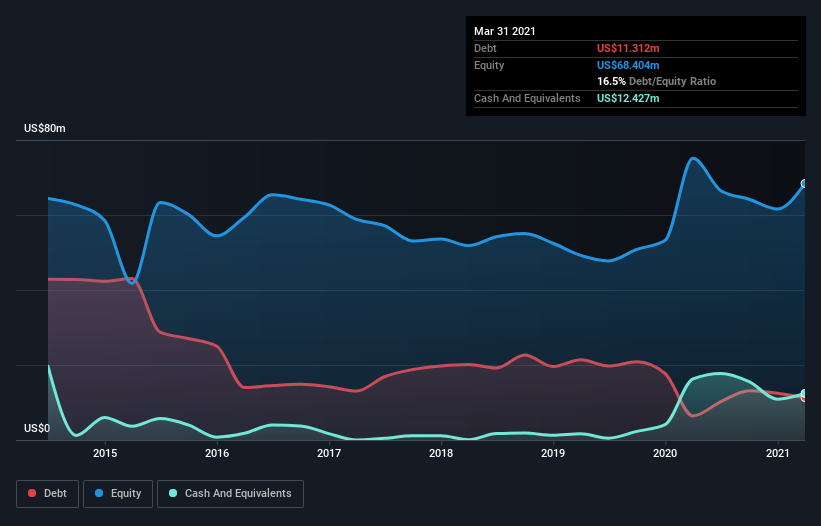Health Check: How Prudently Does Vertex Energy (NASDAQ:VTNR) Use Debt?
Legendary fund manager Li Lu (who Charlie Munger backed) once said, 'The biggest investment risk is not the volatility of prices, but whether you will suffer a permanent loss of capital.' It's only natural to consider a company's balance sheet when you examine how risky it is, since debt is often involved when a business collapses. Importantly, Vertex Energy, Inc. (NASDAQ:VTNR) does carry debt. But the real question is whether this debt is making the company risky.
When Is Debt Dangerous?
Debt and other liabilities become risky for a business when it cannot easily fulfill those obligations, either with free cash flow or by raising capital at an attractive price. Ultimately, if the company can't fulfill its legal obligations to repay debt, shareholders could walk away with nothing. While that is not too common, we often do see indebted companies permanently diluting shareholders because lenders force them to raise capital at a distressed price. Having said that, the most common situation is where a company manages its debt reasonably well - and to its own advantage. When we think about a company's use of debt, we first look at cash and debt together.
View our latest analysis for Vertex Energy
What Is Vertex Energy's Net Debt?
You can click the graphic below for the historical numbers, but it shows that as of March 2021 Vertex Energy had US$11.3m of debt, an increase on US$6.40m, over one year. But on the other hand it also has US$12.4m in cash, leading to a US$1.11m net cash position.
How Healthy Is Vertex Energy's Balance Sheet?
We can see from the most recent balance sheet that Vertex Energy had liabilities of US$27.5m falling due within a year, and liabilities of US$30.8m due beyond that. Offsetting these obligations, it had cash of US$12.4m as well as receivables valued at US$13.0m due within 12 months. So its liabilities total US$32.8m more than the combination of its cash and short-term receivables.
While this might seem like a lot, it is not so bad since Vertex Energy has a market capitalization of US$103.0m, and so it could probably strengthen its balance sheet by raising capital if it needed to. But we definitely want to keep our eyes open to indications that its debt is bringing too much risk. While it does have liabilities worth noting, Vertex Energy also has more cash than debt, so we're pretty confident it can manage its debt safely. The balance sheet is clearly the area to focus on when you are analysing debt. But ultimately the future profitability of the business will decide if Vertex Energy can strengthen its balance sheet over time. So if you want to see what the professionals think, you might find this free report on analyst profit forecasts to be interesting.
In the last year Vertex Energy had a loss before interest and tax, and actually shrunk its revenue by 2.1%, to US$157m. We would much prefer see growth.
So How Risky Is Vertex Energy?
Statistically speaking companies that lose money are riskier than those that make money. And we do note that Vertex Energy had an earnings before interest and tax (EBIT) loss, over the last year. And over the same period it saw negative free cash outflow of US$8.2m and booked a US$21m accounting loss. Given it only has net cash of US$1.11m, the company may need to raise more capital if it doesn't reach break-even soon. Summing up, we're a little skeptical of this one, as it seems fairly risky in the absence of free cashflow. The balance sheet is clearly the area to focus on when you are analysing debt. However, not all investment risk resides within the balance sheet - far from it. For example, we've discovered 2 warning signs for Vertex Energy that you should be aware of before investing here.
If you're interested in investing in businesses that can grow profits without the burden of debt, then check out this free list of growing businesses that have net cash on the balance sheet.
This article by Simply Wall St is general in nature. It does not constitute a recommendation to buy or sell any stock, and does not take account of your objectives, or your financial situation. We aim to bring you long-term focused analysis driven by fundamental data. Note that our analysis may not factor in the latest price-sensitive company announcements or qualitative material. Simply Wall St has no position in any stocks mentioned.
Have feedback on this article? Concerned about the content? Get in touch with us directly. Alternatively, email editorial-team (at) simplywallst.com.

